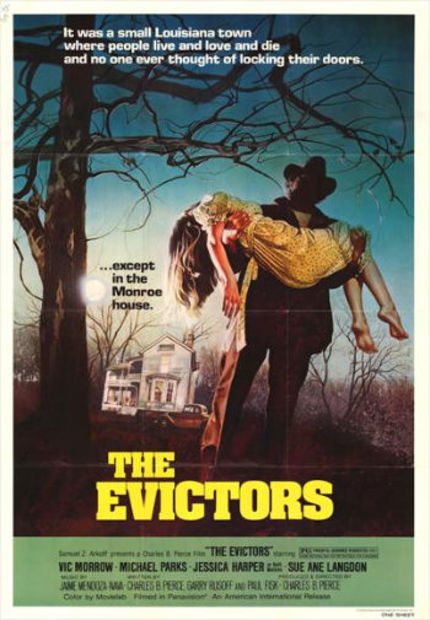70s Rewind: THE EVICTORS

Home invasion has long been a recurring theme in popular cinema, whether it's by little creatures who live in the walls (Guillermo del Toro's remake of Don't Be Afraid of the Dark) or nefarious criminals (Rod Lurie's upcoming remake of Straw Dogs). Sometimes the attack comes from complete strangers for reasons unknown, as in Charles B. Pierce's The Evictors.
Released in 1979, the film stars Michael Parks and Jessica Harper as Ben and Ruth Watkins, a married couple who buy a house in northern Louisiana in the autumn of 1942. Warmly affectionate and tenderly supportive of one other, they moved from New Orleans because Ben has secured a job with a cotton gin, a position that entitles him to a military deferment.
Ruth finds it difficult to make friends with the local townsfolk, who keep their distance, all except Jake Rudd, their realtor (Vic Morrow), and Olie Gibson, a disabled neighbor (Sue Ane Langdon). Ruth is further unsettled when she finds a threatening note in her mailbox ("I want you to move") and then starts to hear tales of previous occupants of the house meeting untimely, perhaps murderous ends.
Unlike other home invasion pictures, such as the recent Ils (AKA Them) or The Strangers, The Evictors favors a less thrilling, lower-key approach, one in which the audience knows more than the lead characters, who remain in the dark as to the possible motive and identity of the attackers. The sepia-toned opening sequence, set in 1928, shows a family resisting the efforts of a bank official and law enforcement officials to evict them from their home.
Thus, the audience can do a little mental arithmetic and deduce that the increasingly violent attacks upon Ruth in her home, always while Ben is away, are directly related to what happened in the past. (For those who are a bit slower, the sepia-toned flashbacks do the math for you.) The complete resolution of the mystery, however, doesn't come until the diabolically amusing final scene.
Until then, The Evictors is an enjoyable programmer, slightly above average, delivering more than its share of moments that caught me completely off-guard.
Born in Indiana but raised in south-central Arkansas, Pierce worked at a TV station in Shreveport, first as an art director, then as a weatherman and host of a children's cartoon program. He moved back to Arkansas, establishing an ad agency in Texarkana while also "playing a character called Mayor Chuckles on a local television show," according to the Encyclopedia of Arkansas.
(IMDB.com lists many credits for Pierce as a set decorator, beginning in 1966, which is difficult to square with the fact that he was living and working in Louisiana and Arkansas, and later owned an advertising agency during that time before he made his first movie. It's possible that he worked on films and TV shows that shot on location near where he lived, but it's more likely that the credits of similarly-named individuals -- Chuck Pierce, Chester Pierce, Charles R. Pierce -- were conflated with his legitimate credits.)
Hearing about local sightings of a Sasquatch-like creature in 1971, Pierce determined to make a movie about it, even fashioning his own movie camera. Shot in semi-documentary style The Legend of Boggy Creek became a huge success in 1972, grossing more than $25 million against a reported budget of $165,000, and eventually serving as an inspiration for The Blair Witch Project.
Pierce has been described as a regional filmmaker, raising money independently (and locally), developing themes that were especially appealing to Southern (rural) audiences. I've only seen four of his films; for all the non-professionals and the limited budgets, 1974's Bootleggers, photographed by Tak Fijimoto right after Badlands, and 1977's Grayeagle hold up as well as The Evictors does. Pierce's limitations became more apparent in 1978's The Norseman, a stilted, belabored fashion that seems to have been made in the style of its leading man, Lee Majors. It's a chore to watch.
In that sense, then, The Evictors marked a return to form for Pierce. The film benefits from the presence of Jessica Harper, who debuted in Brian DePalma's Phantom of the Paradise and had roles in Inserts and Woody Allen's Love and Death before starring in Dario Argento's Suspiria. She generates sympathy for her somewhat underwritten character and manifests a believable level of fear.
Vic Morrow, who is top-billed, has only a minimal amount of screen time, but it's less about the size of the role than his ability to make others uneasy through his silently menacing appearance. We keep waiting for his smile to turn into a scowl.
In the U.S., The Evictors is currently available to stream on Netflix's Instant Watch service. The film was released on videotape, but does not appear to have been released officially on DVD.







